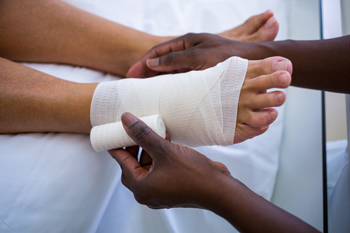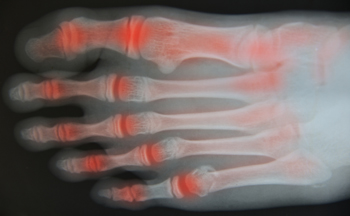Items filtered by date: March 2022
Where Are Plantar Warts Found?

A specific type of growth on the bottom of the foot is known as a plantar wart. It grows inward as a result of the constant pressure the feet endure from walking and standing for the majority of the day. It is known to be caused by the human papillomavirus (HPV), and is contagious. The virus can enter the body through a small break in the skin and can cause an infection. These warts can form in a variety of shapes and sizes and cause severe pain and discomfort. They appear to be thickened portions of skin with small blood vessels in the center, which appear as tiny black dots. If you think you may have plantar warts, it is strongly suggested that you see a podiatrist for a proper diagnosis and treatment solutions.
Plantar warts can be very uncomfortable. If you need your feet checked, contact Dr. Odin De Los Reyes from Connecticut. Our doctor will assist you with all of your foot and ankle needs.
About Plantar Warts
Plantar warts are the result of HPV, or human papillomavirus, getting into open wounds on the feet. They are mostly found on the heels or balls of the feet.
While plantar warts are generally harmless, those experiencing excessive pain or those suffering from diabetes or a compromised immune system require immediate medical care. Plantar warts are easily diagnosed, usually through scraping off a bit of rough skin or by getting a biopsy.
Symptoms
- Lesions on the bottom of your feet, usually rough and grainy
- Hard or thick callused spots
- Wart seeds, which are small clotted blood vessels that look like little black spots
- Pain, discomfort, or tenderness of your feet when walking or standing
Treatment
- Freezing
- Electric tool removal
- Laser Treatment
- Topical Creams (prescription only)
- Over-the-counter medications
To help prevent developing plantar warts, avoid walking barefoot over abrasive surfaces that can cause cuts or wounds for HPV to get into. Avoiding direct contact with other warts, as well as not picking or rubbing existing warts, can help prevent the further spread of plantar warts. However, if you think you have developed plantar warts, speak to your podiatrist. He or she can diagnose the warts on your feet and recommend the appropriate treatment options.
If you have any questions please feel free to contact our offices located in Southbury and Farmington, CT . We offer the newest diagnostic and treatment technologies for all your foot and ankle needs.
The Importance of Caring for Foot Ulcers
Anyone can develop foot ulcers – but conditions such as neuropathy, poor circulation, foot deformities (like a bunion or hammertoe), or uncontrolled blood sugar, increase their likelihood. Foot ulcers are especially common among diabetics, and if left untreated can cause serious problems, even amputation of a foot or limb. The main culprit is a lack of feeling of pain, which leads to ignoring sores or wounds as they occur. Poor circulation lowers the body’s ability to heal properly, increasing the risk of foot ulcers developing. It is extremely important to keep the ulcer from becoming infected. Keep the area clean and bandaged, cleanse the wound daily, avoid walking barefoot, and monitor glucose levels. If the wound becomes infected, however, it is strongly suggested that you seek the regular care of a podiatrist who can examine the infected area and create an ongoing treatment plan. Such measures may include prescribing antibiotics, cleansing the wound, and even hospitalization, depending on the severity.
Wound care is an important part in dealing with diabetes. If you have diabetes and a foot wound or would like more information about wound care for diabetics, consult with Dr. Odin De Los Reyes from Connecticut. Our doctor will assess your condition and provide you with quality foot and ankle treatment.
What Is Wound Care?
Wound care is the practice of taking proper care of a wound. This can range from the smallest to the largest of wounds. While everyone can benefit from proper wound care, it is much more important for diabetics. Diabetics often suffer from poor blood circulation which causes wounds to heal much slower than they would in a non-diabetic.
What Is the Importance of Wound Care?
While it may not seem apparent with small ulcers on the foot, for diabetics, any size ulcer can become infected. Diabetics often also suffer from neuropathy, or nerve loss. This means they might not even feel when they have an ulcer on their foot. If the wound becomes severely infected, amputation may be necessary. Therefore, it is of the upmost importance to properly care for any and all foot wounds.
How to Care for Wounds
The best way to care for foot wounds is to prevent them. For diabetics, this means daily inspections of the feet for any signs of abnormalities or ulcers. It is also recommended to see a podiatrist several times a year for a foot inspection. If you do have an ulcer, run the wound under water to clear dirt from the wound; then apply antibiotic ointment to the wound and cover with a bandage. Bandages should be changed daily and keeping pressure off the wound is smart. It is advised to see a podiatrist, who can keep an eye on it.
If you have any questions, please feel free to contact our offices located in Southbury and Farmington, CT . We offer the newest diagnostic and treatment technologies for all your foot care needs.
Heel Pain Can Be Treated!
Psoriatic Arthritis and Foot Care
One of the main targets of psoriatic arthritis (PsA) is your feet and ankles. It can cause swelling, inflammation, stiffness, and difficulty walking, as well as other symptoms. It can also result in a condition known as sausage toes (where the entire toe swells up), heel pain due to the Achilles tendon becoming inflamed, flattening of the arch, and painful calluses or sores over the joints. Because these ailments can be very painful, the tendency is for the sufferer to cease activity, which can actually make the condition worse. Fortunately, you can help to manage these symptoms by changing the type of shoes you wear, doing exercises to strengthen and stretch the feet, and taking non-steroidal anti-inflammatory medication. Anyone with psoriatic arthritis that has severely affected their feet, ankles, and/or toes, would be wise to begin regular visits with a podiatrist who can determine the appropriate course of treatment.
Arthritis can be a difficult condition to live with. If you are seeking treatment, contact Dr. Odin De Los Reyes from Connecticut. Our doctor can provide the care you need to keep you pain-free and on your feet.
Arthritic Foot Care
Arthritis is a joint disorder that involves the inflammation of different joints in your body, such as those in your feet. Arthritis is often caused by a degenerative joint disease and causes mild to severe pain in all affected areas. In addition to this, swelling and stiffness in the affected joints can also be a common symptom of arthritis.
In many cases, wearing ill-fitting shoes can worsen the effects and pain of arthritis. Wearing shoes that have a lower heel and extra room can help your feet feel more comfortable. In cases of rheumatoid arthritis, the arch in your foot may become problematic. Buying shoes with proper arch support that contour to your feet can help immensely.
Alleviating Arthritic Pain
- Exercises that stretch the foot can prevent further pain and injury and increase mobility
- Most of the pain can be alleviated with anti-inflammatory drugs, heat, and topical medications
- Massages can help temporarily alleviate pain.
It is best to see your doctor for the treatment that is right for your needs and symptoms. Conditions vary, and a podiatrist can help you determine the right method of care for your feet.
If you have any questions, please feel free to contact our offices located in Southbury and Farmington, CT . We offer the newest diagnostic tools and technology to treat your foot and ankle needs.
Obesity and Poor Foot Health
 Obesity is a growing problem with effects that can damage the health of your whole body. The feet and lower limbs are often affected by obesity. One survey found that 51% of adults who described their foot health as “fair” or “poor” were obese. Increasing BMI is strongly associated with increased foot pain and disability. Being significantly overweight can put excess pressure on the feet, straining the ligaments, muscles, bones, and joints that allow you to stand, walk, run, and move about during your daily activities. Maintaining a healthy weight, conversely, can improve your foot health, helping you avoid pain, injury, and disability. For more information about the relationship between body weight and foot health, please consult with a podiatrist.
Obesity is a growing problem with effects that can damage the health of your whole body. The feet and lower limbs are often affected by obesity. One survey found that 51% of adults who described their foot health as “fair” or “poor” were obese. Increasing BMI is strongly associated with increased foot pain and disability. Being significantly overweight can put excess pressure on the feet, straining the ligaments, muscles, bones, and joints that allow you to stand, walk, run, and move about during your daily activities. Maintaining a healthy weight, conversely, can improve your foot health, helping you avoid pain, injury, and disability. For more information about the relationship between body weight and foot health, please consult with a podiatrist.
The more you weigh, the harder your feet must work to support your body. If you’re an obese individual and are concerned about your feet, contact Dr. Odin De Los Reyes from Connecticut. Our doctor can provide the care you need to keep you pain-free and on your feet.
Obesity and Your Feet
People who are overweight are putting more pressure on their ankles, knees, and hips as well as their feet. This unfortunately can lead to variety of different issues.
Problems & Complications Stemming from Obesity
- When the body is overweight, it tries to compensate by changing the way that it moves. An obese person may lean forward and put extra weight on the wrong part of the foot. This puts unnecessary stress on the feet.
- Obese people are also more likely to develop type II diabetes which is a condition that causes a lot of foot problems. People with diabetes often don’t feel the cuts and sores that they may have on their feet, which can lead to more complicated and severe issues.
- Plantar fasciitis is another foot condition that can be caused by obesity. Plantar fasciitis is an inflammation of the tissue along the bottom of the foot, which causes pain and stiffness while walking and climbing stairs.
If you have any questions, please feel free to contact our offices located in Southbury and Farmington, CT . We offer the newest diagnostic and treatment technologies for all your foot care needs.
What Causes the Feet to Swell During Pregnancy?
 It is very common for pregnant women to experience swelling in the feet and legs during pregnancy. This swelling occurs because the body holds more water than usual, and that water pools in the lower part of the body. The swelling can get very uncomfortable, but it is usually not harmful. However, it is important to note that if there is a sudden increase in swelling, it should be monitored as soon as possible, because this could be a sign of preeclampsia. Ways that swelling can be reduced include not standing for long periods of time, wearing comfortable shoes and socks that aren’t too tight, resting with the feet up, and consistently going for walks. Patients who are struggling with swelling feet during their pregnancy would be wise to consult with a podiatrist to help manage and monitor the situation.
It is very common for pregnant women to experience swelling in the feet and legs during pregnancy. This swelling occurs because the body holds more water than usual, and that water pools in the lower part of the body. The swelling can get very uncomfortable, but it is usually not harmful. However, it is important to note that if there is a sudden increase in swelling, it should be monitored as soon as possible, because this could be a sign of preeclampsia. Ways that swelling can be reduced include not standing for long periods of time, wearing comfortable shoes and socks that aren’t too tight, resting with the feet up, and consistently going for walks. Patients who are struggling with swelling feet during their pregnancy would be wise to consult with a podiatrist to help manage and monitor the situation.
Pregnant women with swollen feet can be treated with a variety of different methods that are readily available. For more information about other cures for swollen feet during pregnancy, consult with Dr. Odin De Los Reyes from Connecticut. Our doctor will attend to all of your foot and ankle needs.
What Foot Problems Can Arise During Pregnancy?
One problem that can occur is overpronation, which occurs when the arch of the foot flattens and tends to roll inward. This can cause pain and discomfort in your heels while you’re walking or even just standing up, trying to support your baby.
Another problem is edema, or swelling in the extremities. This often affects the feet during pregnancy but tends to occur in the later stages.
How Can I Keep My Feet Healthy During Pregnancy?
- Wearing orthotics can provide extra support for the feet and help distribute weight evenly
- Minimize the amount of time spent walking barefoot
- Wear shoes with good arch support
- Wear shoes that allow for good circulation to the feet
- Elevate feet if you experience swelling
- Massage your feet
- Get regular, light exercise, such as walking, to promote blood circulation to the feet
If you have any questions please feel free to contact our offices located in Southbury and Farmington, CT . We offer the newest diagnostic and treatment technologies for all your foot and ankle needs.



